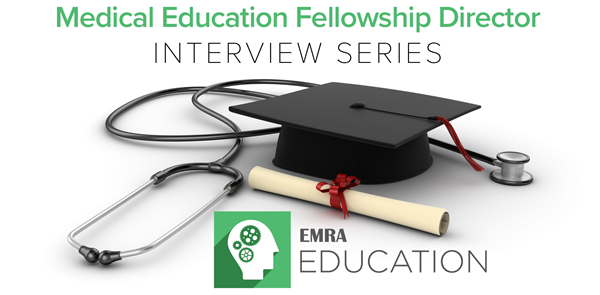The EMRA Education Committee is excited to bring you the Medical Education Fellowship Director Interview Series, which will allow Medical Education Fellowship Directors a platform to describe their fellowship program, highlight different medical education career paths, and provide resources for potential fellows.
If you are a MedEd Fellowship Director interested in submitting a profile on your program, please email EducationCtte@emra.org.
Medical Education & Technology Fellowship at University of South Carolina-Greenville, Prisma Health-Upstate
Director: Sara Dimeo, MD
Title: Fellowship Director, Clinical Assistant Professor
Institution: University of South Carolina-Greenville, Prisma Health-Upstate
Find us online: Visit our program's website, @saraparamd, @greenvilleSCEM
Tell us about you and your program.
I graduated from the two-year Multimedia Design Education Technology (MDEdTech) fellowship, with a master’s degree, from UC Irvine in 2019 and now have settled down as faculty in lovely Greenville, South Carolina. The emphasis of our fellowship is slightly unique, as we will focus on educating the modern learner through interactive learning, educational technology, and principles of multimedia design. Our fellowship will certainly also span core areas of medical education (undergraduate, graduate, and continuing medical education, etc.) through both hands-on and theoretical learning. It is preferably two years with a funded master’s degree component; however, we will consider one-year applicants as well.
How did you get involved in medical education, and what is your career path that led you to your Fellowship Director position?
I first became interested in medical education during my residency, when I noticed I had difficulty learning from the typical 30- to 60-minute traditional didactic conference format. During my third year, I joined the EMRA Education Committee and was fortunate to get involved nationally with some really exciting projects. I served as Director of Education on the EMRA Board of Directors for 2 years, which gave me a very broad perspective on what is going on in medical education today. My fellowship at UC Irvine was also formative in developing my interests and in obtaining my position as a new faculty member here in Greenville.
What are the benefits to completing a fellowship in medical education?
It really depends on your career goals. In my case, I really enjoyed working with residents and wanted to continue to do so in a meaningful way. I will say, when I was searching for jobs, many residency programs were looking for a fresh perspective on education and wanted expertise in these areas, which made my skills very marketable.
Does your program have a particular niche within medical education or unique aspects potential fellows should be aware of?
As stated above, our curriculum includes elements such as slide design/multimedia principles, use of unique technology such as 3D printing, and interactive elements such as escape rooms to "gamify" learning.
What are the different career paths that fellowship graduates from your program have taken after graduation?
Our inaugural fellow, Dr. Caroline Astemborski (Stoddard) will start this summer, so we will keep you updated!
What advice do you have for residents who are just starting to get involved in medical education, especially residents who may not have a lot of resources at their own program?
Once you've decided you may be interested in medical education, I would definitely encourage you to:
- Start at your home institution - Look to those in medical education within your institution, whether that is a clerkship director or a program director. Volunteer to teach medical students or residents. If there is not already a medical education track, see if you can develop one or complete a medical education elective.
- Join the EMRA Education Committee.
- Attend CORD’s Academic Assembly, which is the primary EM medical education conference.
What qualities does your program look for in potential fellows?
Someone who thinks creatively, is organized, and is passionate about the focus of our program!
What is the application and interview process like at your program (ie, application requirements, timeline, match process, participation in CORD universal offer day)?
Since this is the first year of our fellowship and we only interviewed internal candidates last year, this will be a dynamic process for the upcoming year. Check out our program's website for updates, and you may also email me at sara.dimeo@prismahealth.org for more information.
What are your thoughts on the value of a master’s degree in medical education? Does your program require it or accommodate fellows who want to pursue one?
Having gone through a master’s degree program, I have found it to be essential in my own development. However, everyone’s situation is unique, so we will certainly consider applicants who do not want to pursue a two-year / master’s degree track.
If a resident is interested in getting to know more about your program, what is the best way for them to get in touch with you?
As above, please email me with any questions! Sara.dimeo@prismahealth.org



